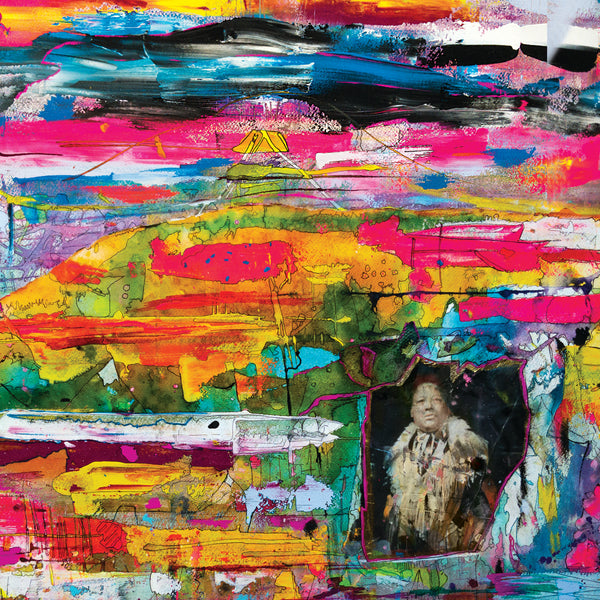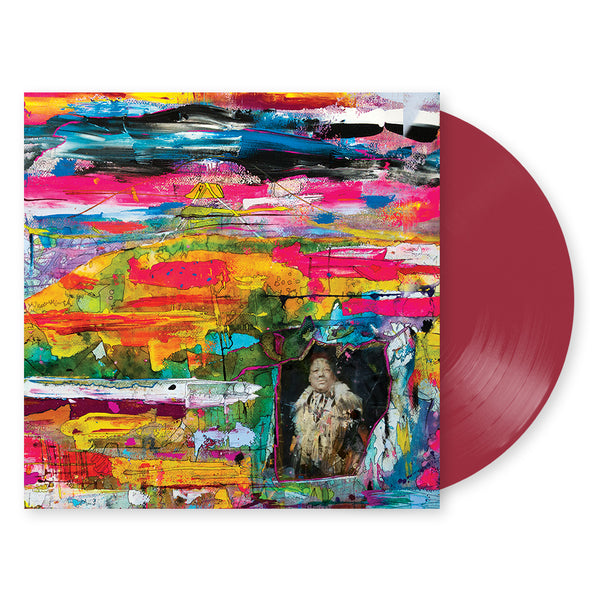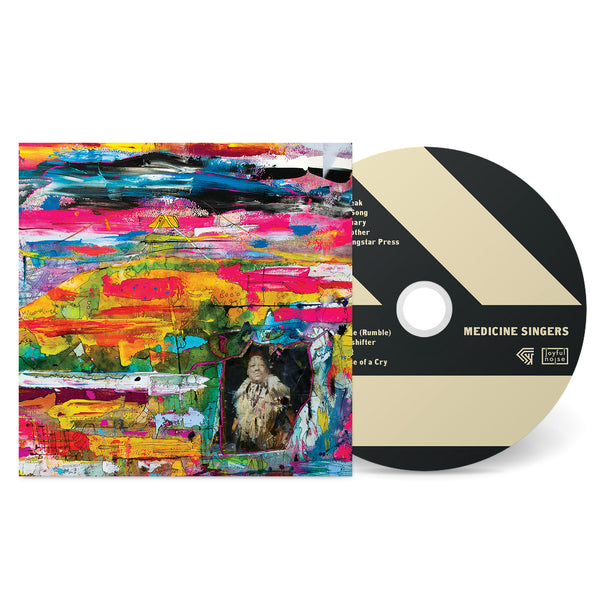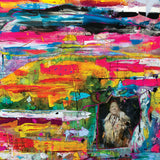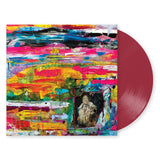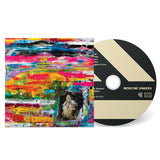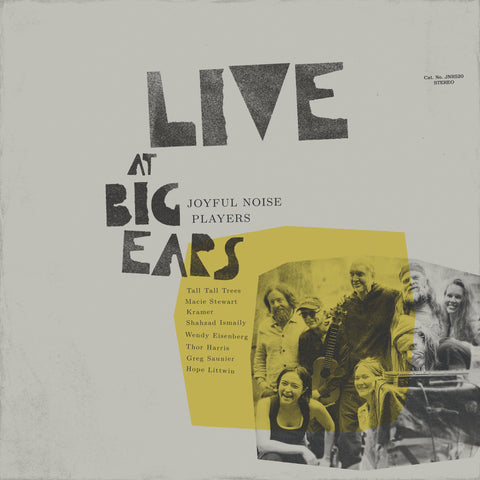$ 22.00 USD
SOLD OUT
Track Listing / Listen
Description
The Medicine Singers self titled debut album on Stone Tapes has its unexpected dual origins in both Native American powwow music and musical improvisation.
That's vividly clear from the spur-of-the-moment story of how the musicians first met and unraveled their sound on an unsuspecting audience in SXSW 2017. What the audience experienced that night was a spontaneous collaboration between a group of musicians of wildly different traditions who only met moments before the show.
“So we were playing outside at this venue in Austin, and I kept seeing these guys watching us perform. After the show, I saw them talking to Ray Two Hawks, and he came back over to me and said, ‘Those guys are rock and roll musicians, and they want us to play with them.’ I wasn’t sure about it, we’d done some collaborations before, but we’d always been more of a traditional drum group.”
After some quick soul searching, Jamieson decided to give it a shot. The results were explosive, and an immediate chemistry was established. “We did one song, and people were screaming for us to come back out,” Jamieson recalled. “We went back onstage and played the rest of the show. People loved it, and that’s how we started out with Yonatan.”
Yonatan Gat, the said New York guitarist who invited the Eastern Medicine Singers to join his band on stage also took notice of the extreme emotional responses that 2017 encounter received. “I remember people were crying during that first show we did together in Austin. With all the wild guitar music I’ve been involved with, I wasn’t used to lifting up my head and seeing everybody in the audience shedding tears. It was a very special moment.”
A few months later, the Eastern Medicine Singers and Gat decided to document their memorable collaboration and entered the studio while the latter was touring through Rhode Island. The result of that impromptu session produced the 2018 track, “Medicine,” and its release propelled the collaboration further, earning the musicians invitations to share the stage on some of the biggest festivals in North America and Europe, bringing their stunning blend of Native American music and psychedelic rock to audiences of tens of thousands around the globe, many of which never experienced powwow music before.
After building so much positive energy from their live shows, it was natural for the Eastern Medicine Singers and Gat to take their collaboration to the next level. The name Medicine Singers was chosen to differentiate the traditional powwow style of the Eastern Medicine Singers which is focused on the Eastern Algonquin language from the their collaborative work with musicians of different traditions, including Gat. The musicians knew right away that they wanted to capture the communal spirit of improvisation that defined their collaboration from the offset, so they chose an improvisation-based approach to recording. “Improvisation encourages people to be themselves,” Gat observed. “With everyone comfortable expressing themselves and reacting to each other, the music is free to go to new places.”
And with their debut statement as a collective, Medicine Singers have done just that, creating a spellbinding musical experience, cycling through a kaleidoscope of sounds, from psychedelic punk to spiritual jazz and electronic music. But the genre-smashing album remains firmly rooted in the intense physical power of the powwow drum and the Medicine Singers’ connection to their ancestral music, creating a daring and ambitious record that celebrates tradition, while boldly breaking away from its restrictions, or in the words of Medicine Singers’ leader Daryl Black Eagle Jamieson: “These two cultures can work together, and blend together, to show people how we can work together and make something beautiful.”
Half a decade after that fateful meeting in 2017, the collaboration reaches a climax with this breathtaking debut album, while helping pave the way to this year’s rising wave of Native contributions to experimental music – shining a spotlight on guest vocalists representing indigenous nations from outside of the Northeastern Woodland tribal area. One good example of that is Joe Rainey, from the Red Lake Band of Chippewa in Minnesota, who is also releasing his own debut album on the 37d03d label this year. “Where else can you get all these different native people singing together on an album?” Jamieson asked. “On this album you have east, west, north and south all coming together. That’s why we say it’s medicine.”
Bridging multiple dimensions of sound, Medicine Singers expanded into a remarkable supergroup that also includes ambient music pioneer Laraaji, Thor Harris and Christopher Pravdica of Swans, “No Wave” icon and former DNA drummer Ikue Mori, and trumpet player jaimie branch, a rising star in the world of improvised music.
“The crew on this record is amazing, so many great musicians wanted to show their support to the Medicine Singers’ music” Gat, who produced the sessions, shares. “You have Ryan Olson throwing production, Ikue Mori adding her electronics, Laraaji is playing beautiful zithers weaving in and out throughout the songs. Gelbart played his solos in the studio with us, and then overdubbed synths like ARP 2500, Synthi-100 and Tonto from the National Music Centre of Canada while we were touring through Alberta. Thor and Chris from Swans bringing that amazing propulsive vibe. The last person to join the session was jaimie branch, who is one of the best trumpet players in the world. It was right after covid hit. She played an incredible 3 minute solo on ‘Sanctuary’ from a cabin in Alaska where she was staying during the pandemic. She also painted the record cover. Most of us were lucky to be together in the same room, improvising together live in the studio before everything shut down, and then when the pandemic hit - friends had time to throw down remotely.”
The provocative clash of sounds and ideas on this record may not sit well with some traditionalists, but Jamieson objects to such concerns. “This is experimental art. We're showing people experimental art from the Eastern Algonquin side of the world.” For Jamieson, this album is more than a collection of songs, it’s a vessel of culture, history and language; a symbol of the strength and creativity of the Eastern Algonquin people in contemporary American society. “I want to show people not only that our Indian culture is just as good as the mainstream white culture that's out there, but also that the two can exist together, side by side.”
That's vividly clear from the spur-of-the-moment story of how the musicians first met and unraveled their sound on an unsuspecting audience in SXSW 2017. What the audience experienced that night was a spontaneous collaboration between a group of musicians of wildly different traditions who only met moments before the show.
“So we were playing outside at this venue in Austin, and I kept seeing these guys watching us perform. After the show, I saw them talking to Ray Two Hawks, and he came back over to me and said, ‘Those guys are rock and roll musicians, and they want us to play with them.’ I wasn’t sure about it, we’d done some collaborations before, but we’d always been more of a traditional drum group.”
After some quick soul searching, Jamieson decided to give it a shot. The results were explosive, and an immediate chemistry was established. “We did one song, and people were screaming for us to come back out,” Jamieson recalled. “We went back onstage and played the rest of the show. People loved it, and that’s how we started out with Yonatan.”
Yonatan Gat, the said New York guitarist who invited the Eastern Medicine Singers to join his band on stage also took notice of the extreme emotional responses that 2017 encounter received. “I remember people were crying during that first show we did together in Austin. With all the wild guitar music I’ve been involved with, I wasn’t used to lifting up my head and seeing everybody in the audience shedding tears. It was a very special moment.”
A few months later, the Eastern Medicine Singers and Gat decided to document their memorable collaboration and entered the studio while the latter was touring through Rhode Island. The result of that impromptu session produced the 2018 track, “Medicine,” and its release propelled the collaboration further, earning the musicians invitations to share the stage on some of the biggest festivals in North America and Europe, bringing their stunning blend of Native American music and psychedelic rock to audiences of tens of thousands around the globe, many of which never experienced powwow music before.
After building so much positive energy from their live shows, it was natural for the Eastern Medicine Singers and Gat to take their collaboration to the next level. The name Medicine Singers was chosen to differentiate the traditional powwow style of the Eastern Medicine Singers which is focused on the Eastern Algonquin language from the their collaborative work with musicians of different traditions, including Gat. The musicians knew right away that they wanted to capture the communal spirit of improvisation that defined their collaboration from the offset, so they chose an improvisation-based approach to recording. “Improvisation encourages people to be themselves,” Gat observed. “With everyone comfortable expressing themselves and reacting to each other, the music is free to go to new places.”
And with their debut statement as a collective, Medicine Singers have done just that, creating a spellbinding musical experience, cycling through a kaleidoscope of sounds, from psychedelic punk to spiritual jazz and electronic music. But the genre-smashing album remains firmly rooted in the intense physical power of the powwow drum and the Medicine Singers’ connection to their ancestral music, creating a daring and ambitious record that celebrates tradition, while boldly breaking away from its restrictions, or in the words of Medicine Singers’ leader Daryl Black Eagle Jamieson: “These two cultures can work together, and blend together, to show people how we can work together and make something beautiful.”
Half a decade after that fateful meeting in 2017, the collaboration reaches a climax with this breathtaking debut album, while helping pave the way to this year’s rising wave of Native contributions to experimental music – shining a spotlight on guest vocalists representing indigenous nations from outside of the Northeastern Woodland tribal area. One good example of that is Joe Rainey, from the Red Lake Band of Chippewa in Minnesota, who is also releasing his own debut album on the 37d03d label this year. “Where else can you get all these different native people singing together on an album?” Jamieson asked. “On this album you have east, west, north and south all coming together. That’s why we say it’s medicine.”
Bridging multiple dimensions of sound, Medicine Singers expanded into a remarkable supergroup that also includes ambient music pioneer Laraaji, Thor Harris and Christopher Pravdica of Swans, “No Wave” icon and former DNA drummer Ikue Mori, and trumpet player jaimie branch, a rising star in the world of improvised music.
“The crew on this record is amazing, so many great musicians wanted to show their support to the Medicine Singers’ music” Gat, who produced the sessions, shares. “You have Ryan Olson throwing production, Ikue Mori adding her electronics, Laraaji is playing beautiful zithers weaving in and out throughout the songs. Gelbart played his solos in the studio with us, and then overdubbed synths like ARP 2500, Synthi-100 and Tonto from the National Music Centre of Canada while we were touring through Alberta. Thor and Chris from Swans bringing that amazing propulsive vibe. The last person to join the session was jaimie branch, who is one of the best trumpet players in the world. It was right after covid hit. She played an incredible 3 minute solo on ‘Sanctuary’ from a cabin in Alaska where she was staying during the pandemic. She also painted the record cover. Most of us were lucky to be together in the same room, improvising together live in the studio before everything shut down, and then when the pandemic hit - friends had time to throw down remotely.”
The provocative clash of sounds and ideas on this record may not sit well with some traditionalists, but Jamieson objects to such concerns. “This is experimental art. We're showing people experimental art from the Eastern Algonquin side of the world.” For Jamieson, this album is more than a collection of songs, it’s a vessel of culture, history and language; a symbol of the strength and creativity of the Eastern Algonquin people in contemporary American society. “I want to show people not only that our Indian culture is just as good as the mainstream white culture that's out there, but also that the two can exist together, side by side.”
The songs on the LP range from contemporary songs written by the Medicine Singers to traditional melodies that date back centuries. Jamieson identified his own composition “Daybreak”, which is sung in a language spoken fluently by less than 10 people anywhere in the world, as a key track on the project. “I took the words from the Algonquin Massachusett dialect, right now there’s less than ten people in the world who speak it. It was approved by our elder Donald Three Bears Fisher, who passed away after the song was finished. I got to play it for him. Three Bears was a traditional guy, but he really liked it, and knowing that he approved was all I needed.”
The album’s third track, “Hawk Song” is a modern powwow favorite written by Medicine Singers member Ray Two Hawks Watson. “The guitar turned it into a rock song. The two styles mesh together so well, it’s like a fireball taking off, and you can see it in the audience when we play it live,” says Jamieson.
“Sunrise (Rumble)” is the centerpiece of the Medicine Singers album, a song which is split into two parts — one a traditional powwow morning song - 'Sunrise' and the other a stunningly unique cover of Shawnee guitarist Link Wray’s 'Rumble'. The Medicine Singers’ interpretation of Rumble explores the influence of indigenous rhythms in rock and roll music, while stripping the song down to only a guitar and a powwow “heartbeat” rhythm, on which Wray is said to have based the song’s original rhythm. Wray himself was born of Shawnee heritage.
"Rumble changed rock music history and it shows that a lot of Native music influenced these Rock'n'Roll beats. 'Rumble' is an extension of our heritage. I'm from the Pocasset tribe and not Shawnee, but I can relate to their struggle. The beat of the song is the heartbeat or double beat - that's the heartbeat of the people. To us it's almost like a resurrection of Link Wray, we put the heartbeat on, to keep his heartbeat alive. It's a song bringing back a legendary Native, who put the pain of his people into the music. For me, it was an honor to expand this song, and bring out the tribal aspects with the drum and singing we added. The vocal intro to Rumble is called Sunrise, an ancient song that’s been around for hundreds of years or even longer.”
Penultimate track, “Sunset” completes the journey that started with 'Daybreak' and 'Sunrise (Rumble)' and serves as the album's climax, descending into hair raising distortion through deep sound design contributions by Ryan Olson and Ikue Mori. The melody has roots that stretch back for centuries, getting passed down many generations. “It was given to our drummer Artie Red Medicine Crippen by the great chief Bright Canoe. Artie, who is from the Shinnecock nation, continued to sing it, and he brought it to our drum. An ancient vocal song, which has the name of the creator - Yahweh. You hear it throughout the song. It’s an ancient, ancient calling to the creator. Artie says it is a thousand years old or more - it very well could be.”
“Sunrise (Rumble)” is the centerpiece of the Medicine Singers album, a song which is split into two parts — one a traditional powwow morning song - 'Sunrise' and the other a stunningly unique cover of Shawnee guitarist Link Wray’s 'Rumble'. The Medicine Singers’ interpretation of Rumble explores the influence of indigenous rhythms in rock and roll music, while stripping the song down to only a guitar and a powwow “heartbeat” rhythm, on which Wray is said to have based the song’s original rhythm. Wray himself was born of Shawnee heritage.
"Rumble changed rock music history and it shows that a lot of Native music influenced these Rock'n'Roll beats. 'Rumble' is an extension of our heritage. I'm from the Pocasset tribe and not Shawnee, but I can relate to their struggle. The beat of the song is the heartbeat or double beat - that's the heartbeat of the people. To us it's almost like a resurrection of Link Wray, we put the heartbeat on, to keep his heartbeat alive. It's a song bringing back a legendary Native, who put the pain of his people into the music. For me, it was an honor to expand this song, and bring out the tribal aspects with the drum and singing we added. The vocal intro to Rumble is called Sunrise, an ancient song that’s been around for hundreds of years or even longer.”
Penultimate track, “Sunset” completes the journey that started with 'Daybreak' and 'Sunrise (Rumble)' and serves as the album's climax, descending into hair raising distortion through deep sound design contributions by Ryan Olson and Ikue Mori. The melody has roots that stretch back for centuries, getting passed down many generations. “It was given to our drummer Artie Red Medicine Crippen by the great chief Bright Canoe. Artie, who is from the Shinnecock nation, continued to sing it, and he brought it to our drum. An ancient vocal song, which has the name of the creator - Yahweh. You hear it throughout the song. It’s an ancient, ancient calling to the creator. Artie says it is a thousand years old or more - it very well could be.”


